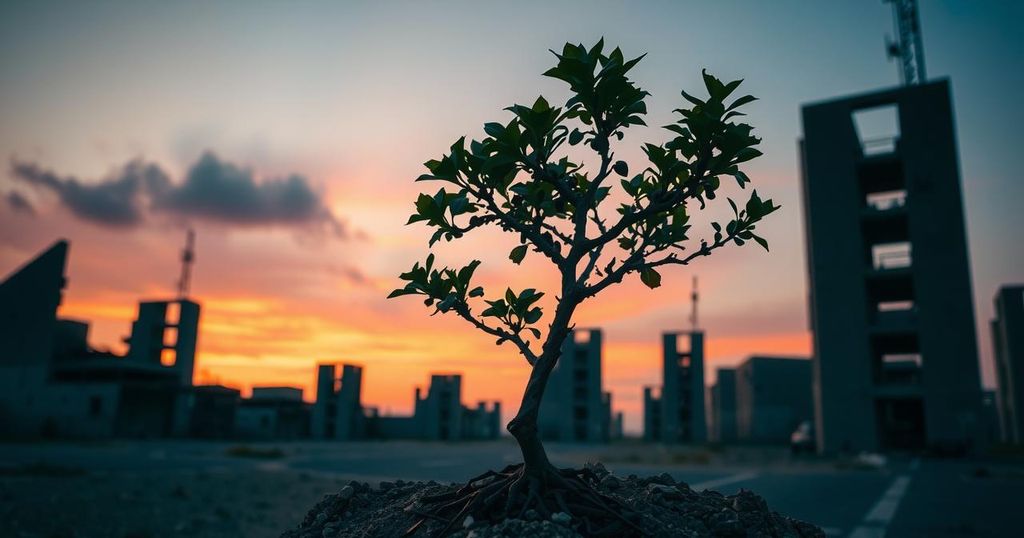Syria faces monumental challenges in recovery, exemplified by the devastation in Jobar following the Assad regime’s oppressive control and war repercussions. Economic instability, property disputes, and international funding barriers hinder reconstruction efforts. Leadership under Ahmad Al Shara offers hope, but substantial reforms and international cooperation are essential for sustainable recovery.
Before the fall of Bashar Al Assad’s regime in December, he and his wife, Asma, conducted celebratory tours through former rebel territories reclaimed by his forces. Their 2018 visit to Jobar, a suburb of Damascus, demonstrates their audacity, as it was one of the most ravaged areas during the civil war. Following a four-year siege, almost every building had been hit by relentless shelling, bombings, and airstrikes from Assad’s forces and Russian artillery. After Jobar’s surrender, art students were tasked with creating sculptures in a rebel-dug tunnel to commemorate the destruction, celebrated by the Assad couple as symbols of victory and peace.
The devastation in Jobar underscores the extensive reconstruction required throughout Syria. Challenges include international consensus on investments, limited funding from the region’s new rulers, Hayat Tahrir Al Sham (HTS), and scarcity of essential materials and energy sources. Furthermore, a volatile currency and a shortage of liquidity impede business activities, while a significant portion of the skilled workforce has fled the country. Public services, particularly the education system, have deteriorated significantly over the years.
UN reports indicate that one-third of houses in Syria suffer damage from the war. The Assad regime’s longstanding arbitrary legal practices exacerbated property disputes, complicating ownership claims in areas where buildings have been destroyed or appropriated for new projects favoring previous regime elites. Many residents, including those from Jobar like Haitham Al Bakhit, continue to regularly visit their hometown amidst the ongoing ruins.
Historically part of Damascus, Jobar has seen limited civic recovery, with some residents tending to livestock amidst abandoned buildings. Al Bakhit, who once washed bodies in the local hospital, now faces hardships as he recalls the town’s destruction, reflecting on the societal impact of the war. Sculptures created in memory of soldiers are at odds with the oppressive security apparatus of the regime.
Under the leadership of Ahmad Al Shara, who formerly had ties to Al-Qaeda, HTS is in a position to attempt state rebuilding efforts. Despite easing some targeted sanctions, foreign aid has not reached the necessary billions for Syria’s recovery, including critical infrastructure rebuilding for energy, healthcare, and education. Al Shara must demonstrate non-confrontational foreign policies to secure substantial international assistance.
Challenges for the new administration also include a crippled economic status, causing civil salaries to lag behind demands and creating a psychological toll on the populace. A noted financial expert indicates that without prompt recovery measures, popular dissatisfaction could escalate. Observational checks reveal minimal signs of improvement across rubble-strewn Jobar.
Real estate interest is showing albeit cautiously, as individuals explore property opportunities in impacted areas. However, corruption risks remain high, with armed HTS personnel involved in property disputes and evictions, often without legal justification. These systemic issues hinder investor confidence, reflecting a persistent apprehension towards rebuilding efforts in urban areas like Damascus.
Problems such as corruption and inefficient bureaucratic structures hinder investor engagement and complicate economic recovery. Although there are optimistic prospects for infrastructure projects, security risks and slow institutional development deter significant international investments, steering potential developers towards self-sufficiency in services instead of larger collaborative revival plans.
The future of Syria, especially in areas like Jobar, is fraught with challenges for reconstruction amidst a backdrop of political instability and severe economic hardship. The leadership of Ahmad Al Shara is pivotal, yet international support hinges on demonstrable reform and reduced conflict. The need for substantial investment, clear legal frameworks, and a viable strategy for rebuilding public trust is paramount to achieving any semblance of recovery in the war-torn region.
Original Source: www.thenationalnews.com






